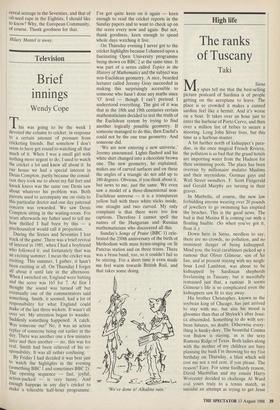Television
Brief innings
Wendy Cope
This was going to be the week I devoted the column to cricket, in response to a certain amount of pressure from cricketing friends. But somehow I don't seem to have got round to watching all that much of it. When I was a small girl with nothing more urgent to do, I used to watch the cricket a lot and knew all about it. In our house we had a special interest in Denis Compton, partly because the consul- tant they took me to about my flat feet and knock knees was the same one Denis saw about whatever his problem was. Both parents used to accompany me on visits to this particular doctor and one day paternal concern was rewarded. We saw Denis Compton sitting in the waiting-room. For years afterwards my father used to tell me how thrilled I had been by this — a Psychoanalyst would call it projection.
During the Sixties and Seventies I lost track of the game. There was a brief revival of interest in 1981, when I had a boyfriend who followed it, and fortunately that was an exciting summer. I mean the cricket was exciting. This summer, I gather, it hasn't been exciting at all. On Thursday I forgot all about it until late in the afternoon. When I switched on, England were batting and the score was 165 for 7. At first I thought the sound was turned off but eventually one of the commentators said something. Smith, it seemed, had a lot of responsibility for what England could make of the last three wickets. It wasn't all over yet. My attention began to wander. Suddenly something happened. A catch. Was someone out? No, it was an action replay of someone being out earlier in the day. There was another one a few minutes later and then another — no, this was for real, Smith had been relieved of his re- sponsibility. It was all rather confusing. By Friday I had decided it was best just to watch the highlights in the evening (something BBC 1 and sometimes BBC 2). The opening sequence — fast, joyful, action-packed — is very funny. And enough happens in any day's cricket to make a tolerable half-hour programme. I've got quite keen on it again — keen enough to read the cricket reports in the Sunday papers and to want to check up on the score every now and again. But not, thank goodness, keen enough to spend whole days watching it live.
On Thursday evening I never got to the cricket highlights because I chanced upon a fascinating Open University programme being shown on BBC 2 at the same time. It was part of a series called Topics in the History of Mathematics and the subject was non-Euclidean geometry. A nice, bearded lecturer called Jeremy Gray succeeded in making this surprisingly accessible to someone who hasn't done any maths since '0' level — though I can't pretend I understood everything. The gist of it was that in the 18th and 19th centuries certain mathematicians decided to test the truth of the Euclidean system by trying to find another logically possible geometry. If someone managed to do this, then Euclid's could not be the one true geometry. And someone did.
'We are now entering a new universe,' Jeremy announced. Lights flashed and his white shirt changed into a chocolate brown one. The new geometry, he explained, makes use of curved surfaces and on these the angles of a triangle do not add up to 180 degrees. Obvious, if you think about it, but news to me, just the same. We even saw a model of a three-dimensional non- Euclidean universe — it is a transparent yellow ball with three white sticks inside, one straight and two curved. My only complaint is that there were too few captions. Therefore I cannot spell the names of the Hungarian and Russian mathematicians who discovered all this.
Sunday's Songs of Praise (BBC 1) cele- brated the 250th anniversary of the birth of Methodism with mass hymn-singing on St Pancras station and on three trains. There was a brass band, too, so it couldn't fail to be stirring. For a short time it even made me feel warm towards British Rail, and that takes some doing.
'We've done it! Alkaline rain.'






















































 Previous page
Previous page